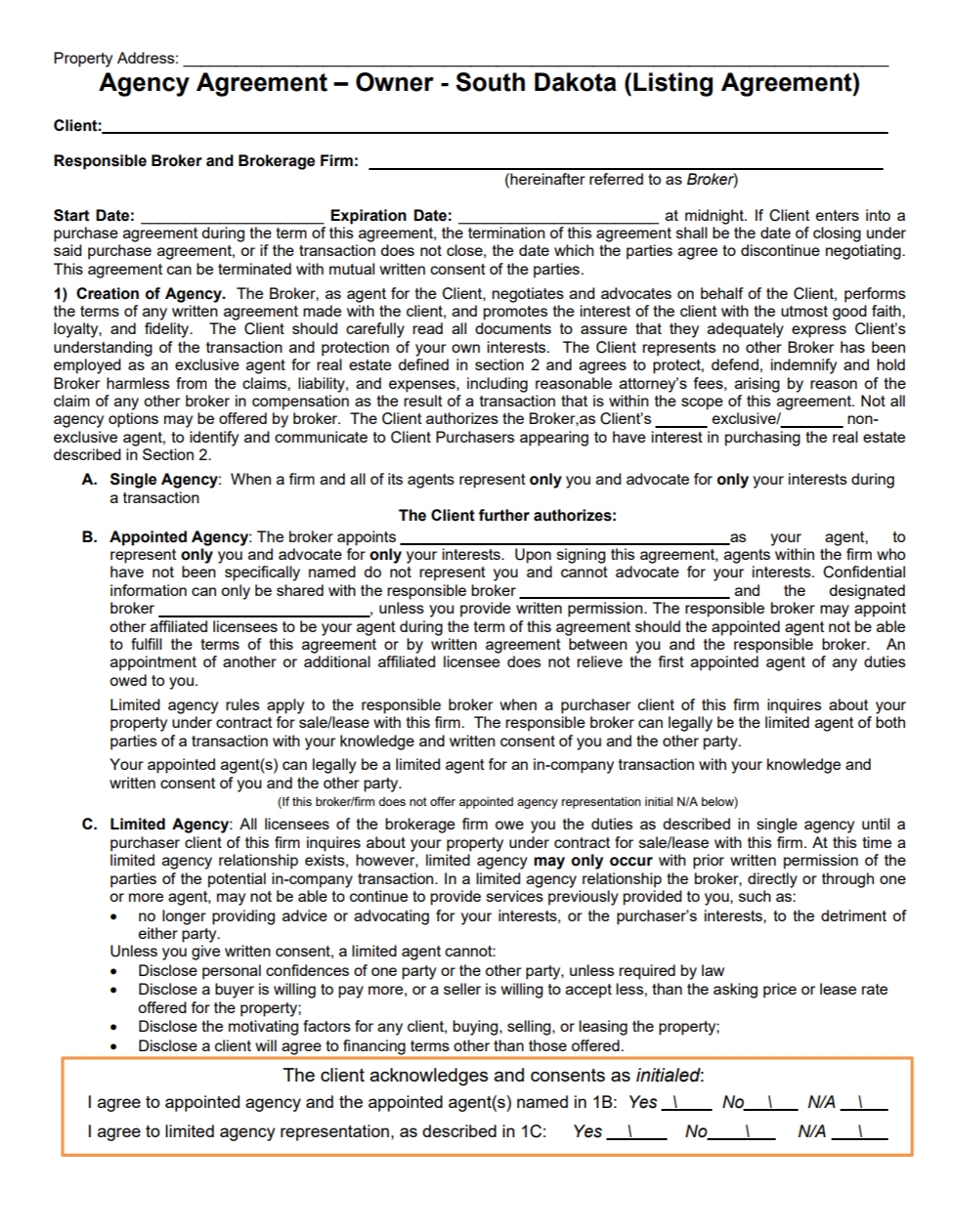Types of Listing Agreements: Understanding Real Estate Agent Contracts With Sellers
What's a listing agreement, and why do you need one? This guide breaks it down.


Written by Tali Bendzak on April 16, 2025
In this article:
- What is a listing agreement?
- What's included in a seller-broker agreement?
- Exclusive right to sell listing agreement
- Exclusive agency listing agreement
- Open listing agreement
- Net listing agreement
Selling a home for the first time? As you're choosing a listing agent, you'll want to do some due diligence and make sure you understand exactly what's included in your real estate agent agreement.
Listing agreements are legal documents that serve as a contract between you and your agent during the course of selling your home. While they can be complicated to decipher, they usually follow a standard format with a few common elements, including the listing price, property details and marketing responsibilities. It’s important to understand what you’re signing so you can recognize if it's missing seller protections, has excessive agent benefits, or includes marketing tactics that may not give you the most successful selling experience. We’ll lay out what a good agent agreement should look like, so your interests are fulfilled, and you can close the deal with confidence.
What is a listing agreement?
A listing agent agreement, also known as a listing agent contract, is a legally binding document between a seller and the real estate agent representing them in the sale of their home. There are several different categories of standard listing agreements, but any agreement can be modified to fit a specific situation.
Most agents who are part of a real estate agent organization or brokerage will use the standard listing agreement provided for them for each type of real estate contract, including:
- Exclusive right to sell
- Exclusive agency
- Open listing agreement
- Net listing agreement
What's included in a seller-broker agreement?
While contracts can be amended or modified, and while addenda may be added, there are some common real estate listing agreement terms:
Commission amount
The commission amount has historically landed between 3% and 6% of the home’s sale price, split roughly 50-50 between your listing agent and the buyer's agent. But there isn’t a set percentage here, so anticipate some negotiation with your agent.
Whether you owe your agent any commission also likely depends on the type of listing agreement that is in place and the services your agent offers — more on that later.
Listing duration
This identifies how long your contract is valid before it expires and your agent is no longer representing you. In most major real estate markets, it's usually three months, but it can be longer or shorter in duration, depending on the state of your local real estate market.
Cancellation clause
The cancellation clause outlines any penalties you will or won't face if you attempt to cancel the contract before your agent successfully sells your home.
Responsibilities
This section details what tasks and services your agent will complete. Common examples include professional photography, getting the home listed on the MLS and detailed marketing services.
Look for mentions of a virtual or 3D tour, as that could help you get more interested buyers (49% of buyers surveyed by Zillow said they’d feel at least somewhat confident making an offer on a home based on just the 3D tour).
You should also read what the agreement says about how your home will be marketed. Will your home be listed on the MLS, where agents, brokers, and buyers can find your home? Or does your agent plan on listing your home privately, where only a select group of agents can find your home? Reduced exposure to potential buyers can lead to a slower sale and a lower price.
Disputes
These are guidelines around how issues or conflicts will be handled. This can include disagreements over listing price or marketing strategies.
Ownership
In this section, you confirm that you are the home's owner, you have the right to sell the house and you're legally allowed to transfer the title.
Expiration
This notes that if the contract expires before the house is purchased, the listing agent can provide a list of all buyers who saw the home while they were the agent. It says that if one of those past buyers comes back after the contract expires and wants to buy the home, the listing agent is still due their commission, within a specified time frame. It's also called a holdover clause or a carryover clause.
Dual agency
This is when a listing agent keeps the full commission because they're representing both the seller and the buyer. It's illegal in many states, and in the states where it is legal, there are restrictions set by both the state and local professional organizations that prevent conflicts of interest. These relationships also require full disclosure and the seller’s written consent to this form of representation.
Type 1: Exclusive right to sell listing agreement
This is the most common type of listing agreement. It says that the listing agent has the exclusive right to earn the commission if they bring the buyer (either directly or via another agent). It's an exclusive contract with your real estate agent that prevents you from working with another agent during the term.
In this arrangement, all offers go through the listing agent, which protects the agent from losing time and money on a deal that they won't receive any commission for.
The contract can sometimes include an exception if one specific person (who is predetermined) ends up buying the home — a specific family member, for example. The name has to be included in the contract before signing, and it must be something that was in the works before listing.
Benefits of an exclusive right to sell listing
Agents work incredibly hard to secure a buyer because they won't get their commission until they do. If you engage a full-service agent with an exclusive right-to-sell listing, you'll get the full real estate agent experience and the expertise that goes along with it.
Type 2: Exclusive agency listing agreement
This type of listing agreement is far less common. In this agreement, you still hire a listing agent, but if you are the one who ends up finding the buyer, you get to keep the commission.
Here is a South Dakota example of the uncommon exclusive agency agreement.
Benefits of an exclusive agency listing agreement
The main benefit here is that you have an opportunity to avoid paying commission. This type of agreement is best for people who want to be hands-on in the process and those who are comfortable investing in their own marketing.
You'll also have the peace of mind that comes with knowing there is still an agent working on your behalf (even though they may not provide all the marketing services a full-service agent typically would).
Set up a good way to track whose marketing efforts got each potential buyer through the door so you'll know who gets the commission.
Type 3: Open listing agreement
An open listing agreement is not a formal contract. Instead of engaging a listing agent, a seller instead allows local buyer's agents to market the listing in hopes of getting the 3% buyer's agent commission.
The whole process happens without a listing agent, sort of like a for sale by owner (FSBO) transaction. To start this process, you would reach out to a handful of local buyer's agents, letting them know that you're willing to pay a buyer's agent commission. If a buyer's agent is interested in this arrangement, they may want to put it in writing before they bring their buyers through the door.
Benefits of an open listing agreement
An open listing provides some flexibility, as you're not committed to one single listing agent agreement. And it gives you the ability to change direction or take the house off the market whenever you want, without a penalty. Since you won’t be using a listing agent in this case, you'll pay half as much in commissions — only the 3% traditionally paid to the buyer's agent.
You'll want to do whatever you can to help the buyer's agents you're engaging sell the home. Give them a good description of the home, share your real estate photos, and give them permission to share your home with their clients as they see fit.
Type 4: Net listing agreement
A less common type of real estate agency agreement, a net listing agreement is when a listing agent guarantees to sell your house for a certain set price, and if they sell the house for a higher amount, they pocket the difference as their commission.
The reason this is a less common agreement is that net listings are illegal in many states. And in the states where they're legal, which include Texas and California, there are rules in place to protect sellers and prevent lawsuits over perceived losses.
Net listing agreement considerations
A net listing can be good for someone who wants a quick sale and a guaranteed price, but it's important to use an agent you trust. Because the listing agent is so invested in your purchase price, they could take advantage of the situation and not show you the lower offers received. That's why these arrangements are illegal in many places — they're considered financially risky.
Ready for a new address?
Get an instant cash offer or list with a local partner agent.
Explore selling optionsRelated Articles
Sell your home with a winning strategy
Here’s how to maximize your home sale with the right selling plan.

Build a smart selling plan
Talk to your agent about their marketing approach - especially online - to ensure you’re getting the best possible price for your home.
 South Dakota
South Dakota


